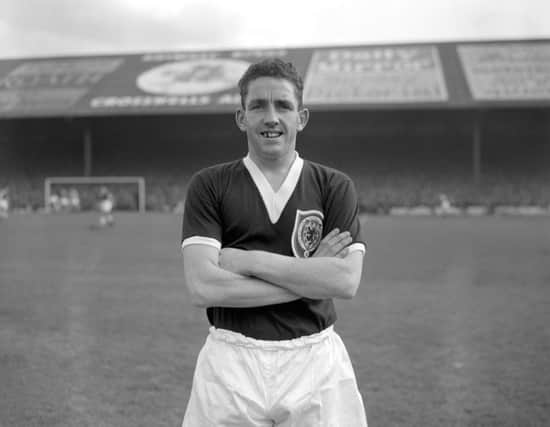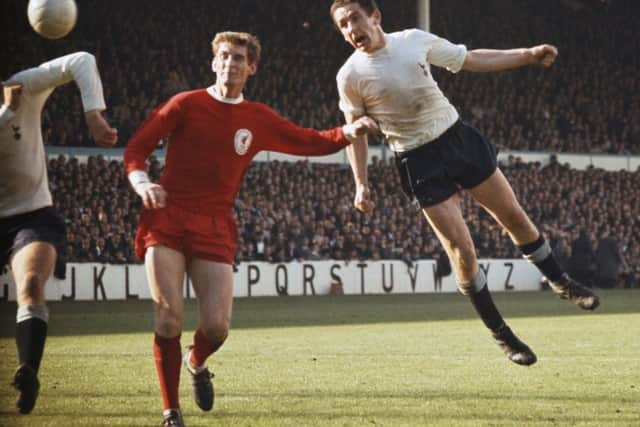‘Dave Mackay the man who’d stand up for Hearts’


It was the spring of 1959. Mackay was 24 years old. He was skipper of a fine Tynecastle side, the reigning league champions. He loved Hearts, the only club he had ever wanted to play for.
But there were moves afoot to sell him. Spurs manager Bill Nicholson, to his eternal credit, took advantage of the opportunity, signing someone teammate Alan Gilzean yesterday said vies with Jimmy Greaves for the title of the greatest player in the English club’s history (Greaves himself has described Mackay as “the most complete professional footballer I’ve ever known”).
Advertisement
Hide AdAdvertisement
Hide AdFor such an inspirational performer, it is fair to say the £32,000 Spurs paid Hearts for their skipper and wing-half counts as remarkable value; a steal, almost. Mackay, after all, had already left an indelible mark on Hearts in his then short career, helping the Tynecastle side win two League Cups, the league title and the Scottish Cup.


It is why the train porter, as recounted by Mackay in his autobiography, The Real Mackay, was so star-struck as he helped load his cases onto the train carriage.
FOLLOW US
SCOTSMAN TABLET AND MOBILE APPS
“Davie Mackay, a pleasure to meet you,” he said. He shook Mackay’s hand, then wondered where he was off to? Somewhere nice? “I’m down to London,” Mackay told him. “I’ve signed for Tottenham Hotspur.” Why keep it a secret, reasoned Mackay. The porter pushed his trolley aside. “He looked at me dumfounded,” wrote Mackay. “He really was lost for words.”
The porter continued to simply watch as Mackay got up into the carriage, the first steps of the rest of his career. Like in a film, Mackay pulled down the window next to his seat, to take some last breaths of Edinburgh air. The porter was still there. He shook his head and then, recovering the power of speech, looked up at the famous footballer and said: “Davie Mackay, the He’rts winnae be the same withoot you”.
British football won’t be the same without him. The range of tributes yesterday was breath-taking. Gary Lineker took time out on Twitter. Even Arsene Wenger, preparing for Arsenal’s league clash against Queens Park Rangers tonight, made reference during his pre-match press conference to an “iconic figure”. Mackay’s legend has been passed down, from generation to generation. But nothing beats the first-hand accounts of those who remember looking across the dressing-room and seeing the reassuring sight of Mackay tying-up his stocking ties.
A couple of years Mackay’s junior, Alex Young followed him first to Newtongrange Star and then on to Hearts. They played together in the team that won the league championship in record-breaking style in 1957-58. The Golden Vision and the Real Mackay. No-one else had a chance, including Rangers, who finished an incredible 13 points behind them.
“I’d never really seen him before I joined Hearts, but he soon made an impact on me when we met,” Young said yesterday. “He was a strong, powerful guy, but didn’t go out to hurt anybody. He was a super player and a super guy as well. He would be cracking jokes all the time. When you were on the pitch it was Mackay you were looking at all the time. He would be shouting, stopping, turning round, telling people what to do. He was our captain and our leader. He was the man who would stand up for Hearts.”
Mackay joined Hearts in 1950, signing the contract on the side of a crumbling tenement wall as he walked home down Dalry Road, with a skip in his step. Nine years later, he described himself as “shell-shocked” when manager Tommy Walker told him Hearts were prepared to let him leave for Spurs. Someone else yesterday remembered feeling dumfounded by the news: The Doc. Tommy Docherty played with Mackay for Scotland and told Ted Drake, his manager at Chelsea at the time, that he had to sign Mackay.
Advertisement
Hide AdAdvertisement
Hide Ad“For some unknown reason he thought Mel Charles was a better player,” Docherty recalled yesterday. “But he went and signed Mel Charles and Bill Nicholson signed Dave, of course.”
Gilzean was one of many glad to have Mackay at the club when he arrived in London from Dundee in 1964. The Scots roomed together for five years, until Mackay left for a successful spell at Derby, first as a player and then as a manager. Gilzean doesn’t normally like doing interviews but he broke his silence yesterday for his old friend. He returned a call from his base in Somerset, a place that must feel a million miles away from the bright lights of London, when Mackay ruled the roost.
“I remember coming out of the tunnel at the old Wembley – the Chelsea and Tottenham players came out together in a line,” said Gillie, with reference to the 1967 FA Cup final, when Mackay led Spurs to victory. “They stop before they tell you to come on. Dave Mackay turned round and said to the other Spurs boys: ‘they do not fancy it one bit’, he shouted. What a character!
“He was so impressive it was untrue,” continued Gillie. “His demeanour, the way he trained – he trained exactly the way as he played. He gave 100 per cent. He hated getting beat. Even in the gym. We used to play with little ice hockey goals and the arguments we used to have. He was so determined to win. He was such an inspirational figure for everyone at Tottenham. I mean, to win two FA Cups and then have two broken legs and come back to win a third one when I played in ’67, illustrate how inspirational he was.
“I think Bill Nick let him go to Derby possibly too early,” added Gillie. “OK, he gave him a free transfer so he could make a few bob.
“But I always remember pre-season training going to the training ground and [Derby manager] Brian Clough was there. I remember thinking, a little fearfully: ‘he is after someone, I bet it’s Dave’.”
And so it was. Like so many others Gillie remembers the sense of loss that was left at White Hart Lane after Mackay had gone. It is the same feeling that fell across British football yesterday.